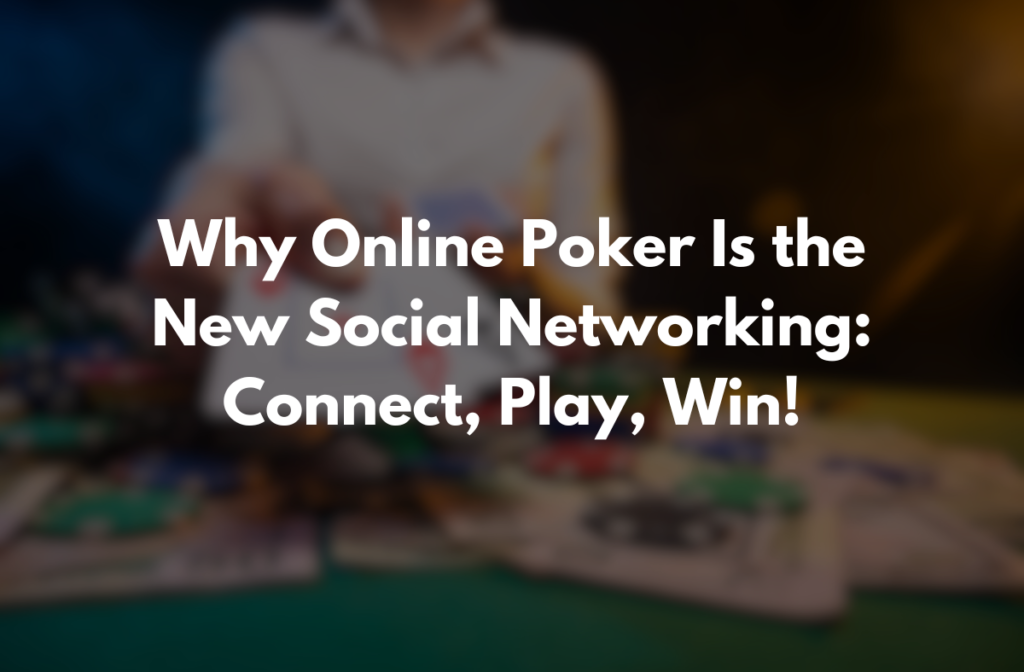
In recent years, the digital realm has seen a significant transformation in how individuals connect, engage, and entertain themselves. Among the myriad of online platforms, online poker has emerged as a unique and compelling means of social interaction, melding the thrill of the game with the connectivity of social networking. This fusion has made online poker not just a game of skill and luck but a modern-day social hub where people from different walks of life can meet, interact, and compete.
The Evolution of Online Poker
The journey of online poker from a niche internet activity to a mainstream social platform mirrors the evolution of social networking sites. Initially, online poker was about the game itself, with little emphasis on the social aspects. Players logged in, played their hands, and left. However, as technology advanced, so did the features of online poker platforms. Chat rooms, friend lists, and interactive tutorials began to appear, transforming solitary gaming into a communal experience.
Online Poker: A Social Networking Phenomenon
Online poker platforms have now become bustling social hubs where players not only come to play but also to interact. These platforms offer various communication tools, including instant messaging, forums, and video chats, making them akin to traditional social networking sites. The competitive nature of poker, combined with these social features, creates a unique environment where friendships and rivalries are formed.
The Psychology Behind the Appeal
The allure of online poker as a form of social networking lies in its ability to provide a sense of community, competition, and achievement. The psychological satisfaction derived from winning a poker hand or tournament is amplified by the social interactions that occur during the game. Players often share strategies, celebrate victories, and commiserate over losses, leading to a rich, emotionally engaging experience.
Connecting Through Competition
Competition is a fundamental human drive, and online poker leverages this by offering a platform where skill, strategy, and luck intersect. Players are not just competing for monetary rewards but also for social recognition within the community. This competitive yet friendly environment fosters a sense of belonging and identity among players
The Role of Technology in Online Poker
Technological advancements have played a crucial role in the evolution of online poker. Highspeed internet, sophisticated gaming software, and mobile technology have made online poker accessible and enjoyable. Features like live streaming, multi-tabling, and advanced analytics have enhanced the gaming experience, making it more interactive and socially engaging.
Online Poker Communities: Beyond the Game
Online poker communities extend beyond the virtual tables. Many players participate in forums, social media groups, and even real-world events, creating a culture that revolves around the game. These communities provide a platform for sharing knowledge, organizing tournaments, and discussing the latest trends in poker
Strategies for Winning: Skill Building in a Social Context
Winning at online poker requires more than just luck; it demands skill, strategy, and continuous learning. The social aspect of online poker facilitates this by enabling players to exchange tips, analyze gameplay, and collaborate on strategies. This collective intelligence approach not only improves individual performance but also elevates the overall level of play within the community
The Economic Impact of Online Poker
The popularity of online poker has significant economic implications. It generates revenue through tournament fees, rake, and in-game purchases, contributing to the digital economy. Additionally, it creates jobs and opportunities in technology, marketing, and customer service sectors related to the gaming industry.
Legal and Ethical Considerations
As with any form of online gaming, online poker faces legal and ethical challenges. Issues such as gambling regulations, data privacy, and fair play are paramount. Reputable platforms invest in security measures, fair play algorithms, and responsible gaming policies to ensure a safe and ethical environment for their users.
The Future of Online Poker as a Social Network
The future of online poker looks promising, with technological innovations like virtual reality, artificial intelligence, and blockchain poised to revolutionize the experience. These technologies could make the game more immersive, secure, and transparent, further cementing online poker’s status as a prominent social networking platform.
FAQ
Q: Is online poker just about gambling?
A: While poker involves elements of betting, online poker platforms emphasize skill, strategy, and social interaction, making it much more than just gambling.
Q: Can beginners participate in online poker communities?
A: Absolutely. Online poker communities are welcoming to players of all skill levels, with many platforms offering tutorials, practice tables, and forums specifically designed for beginners.
Q: Are online poker games fair?
A: Reputable online poker sites use Random Number Generators (RNGs) to ensure fair play and are regularly audited by independent bodies to maintain integrity.
Q: How do I start playing online poker?
A: To start, choose a reputable online poker platform, create an account, and familiarize yourself with the rules and etiquette of the game. How to join our clubs? Message t.me/Poker_Performance on Telegram or visit BluffingMonkeys.com & start a live chat to get started
